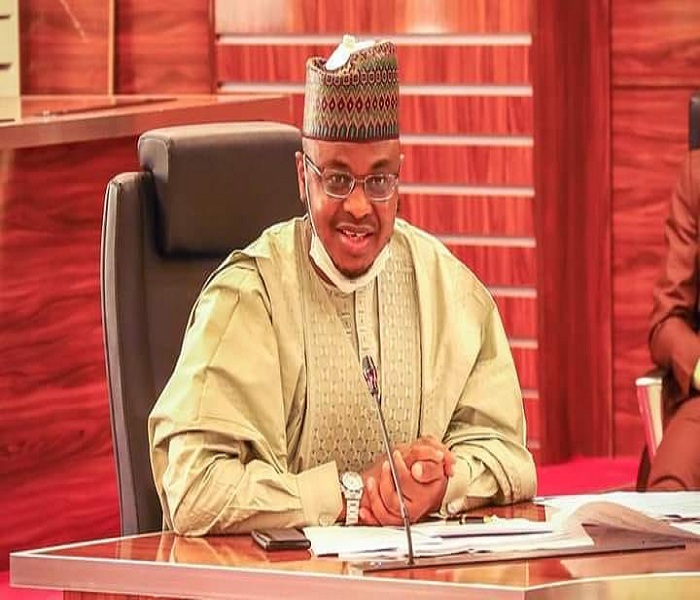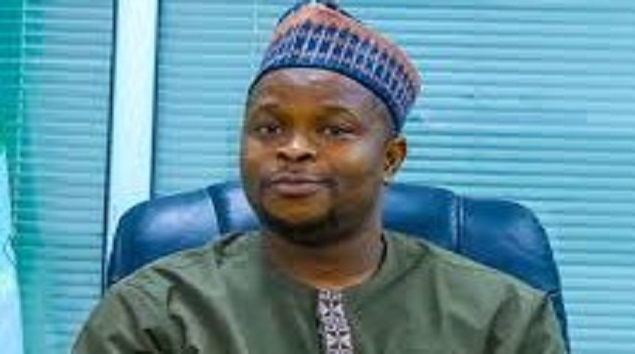Telecom
Digital Technologies Facilitating Nigeria’s Anti-Corruption Crusade — Pantami

Dr Isa Ali Ibrahim Pantami, minister of Communications and Digital Economy, has said that digital technologies are facilitating the Anti-Corruption crusade of the administration of President Muhammadu Buhari, in Nigeria.

Dr Isa Ali Ibrahim Pantami, minister of Communications and Digital Economy
The minister, who was represented by Mrs Abimbola Alale, Mananging Director, Nigeria Communications Satellite (NIGCOMSAT), said this at the 2021 Pre-Democracy Day Conference with the theme “Appraising the Impact of President Muhamadu Buhari’s Anti-Corruption Fight on the Nigerian Economy since 2015”, organised by Global Integrity Crusade Network (GICN) in collaboration with Transparency Advocacy Development Initiative (TADI) in Abuja.
Dr Pantami said government policies, such as; Treasury Single Account (TSA), Integrated Personnel and Payroll Information System (IPPIS), Government Information Financial Management Information System (GIFMIS), Bank Verification Number (BVN), among others, are good success stories of ICT adoption to combat corruption. He stated that the implementation of TSA and IPPIS/BVN is saving the country billions of naira every month, and had facilitated the elimination of ghost workers in various MDAs.
“In Nigeria, ICT has supported the fight against corruption by raising accountability and transparency through online services, transparency or open data portals, crowdsource and online corruption reporting, service automation and digitalization”, he said.
While presenting a paper at the same event, Mallam Kashifu Inuwa Abdullahi, Director General/CEO, National Information Technology Development Agency (NITDA), said, innovative ideas will help in curtailing corruption in Nigeria.
Abdullahi said the President Muhammadu Buhari-led administration’s commitment at the global level, led to Nigeria joining the Open Government Partnership (OGP) in July 2016 as the 70th country. The OGP is an international multi-stakeholder initiative focused on improving transparency, accountability, citizen participation and responsiveness to citizens through technology and innovation.
The DG, who was represented by Usman Gambo Abdullahi, Director, IT Infrastructure Solutions at NITDA said, the administration has shown its commitment by launching the National Digital Economy Policy and Strategy (NDEPS 2020 – 2030) for a Digital Nigeria.
He said, the goal of NDEPS is to promote the use of digital technologies to enhance transparency and anti-corruption, which is at the heart of the digital economy.
He noted that IT Projects Clearance Process of NITDA facilitated unprecedented improvement in IT Projects delivery in Federal Public Institutions, which resulted in saving over 22.5 Billion Naira for the Federal Government.
The IT Regulator’s CEO cited the National Anti-Corruption Strategy (NACS 2017-2021), which is anchored on 5 Pillars namely; Prevention, Engagement, Ethical Re-orientation; Enforcement, Sanctions and Recovery; and Management of Proceeds of Crime. Adding that; “in each of these, efforts were made to ensure adequate utilization of ICT towards their realization”.
He also stated that the shift in funds from resource-based and physical economy to a digital economy requires a supply-demand matching approach to digital resources and market-creating innovations as mentioned earlier.
“On the aspect of supply, we are working to ensure government services are digital, end-to-end. We are working with National Identity Management Commission (NIMC), to increase enrollment drastically. The identity enrollment database has grown to 54 million.
“We want to ensure all Nigerians have a digital identity in the coming years. We are providing an enabling environment for last-mile broadband penetration. There are about 150 million internet users with about 42.93% broadband penetration,” the DG said.
“On the demand side, we are focusing on digital literacy and the skills required to uptake digital services across different levels of the masses.
“We are creating activities that will increase the demand for digital content and services by the citizens. Our strategy is to focus more on market-creating innovations that would impact the economy, create massive jobs and lift many Nigerians out of poverty.
“Ultimately, this principle will reduce corruption in our systems and help us develop as a country,” he added.
The Conference Coordinator and President of GICN, Barr. Edward E. Omaga, during his welcome address said the essence of the conference was to painstakingly appraise the effort of President Muhammadu Buhari’s led administration towards combating the menace called corruption.
Telecom
NCC Orders Telcos Inform Subscribers of Data Breach within 48 Hours

Nigerian Communications Commission (NCC) has directed telecom operators in the country to notify affected customers of any data breach within 48 hours ( that is two day) of detecting such unauthorised infringement.

This directive was contained in the revised Internet Code of Practice 2026 by the NCC, on Friday.
The document seeks to define the rights and obligations of telecom operators in handing the rights of internet users to an open internet.
In the move to protect customer information, Mobile Network Operators (MNOs) and Internet Service Providers (ISPs) are to take necessary measures to protect customers’ data from unauthorised use, disclosure, access or breach.
Telecom operators must now notify affected customers within 48 hours of detecting a compromise through text message, email or any other effective means. As contained in Chapter 3.4 of the regulation titled “Data Breach Notifications,”
The telecoms companies are also directed to notify the NCC of such a breach not later than 48 hours after determining such a breach.
“Where full details of the breach are not immediately available, the provider shall issue a preliminary notification within the same period and furnish a comprehensive update within Fourteen (14) days thereafter, or within such extended period as the Commission may approve,” part of the section reads.
The guidelines, according to NCC, are in tandem with the provisions contained in the Nigerian Data Protection Act 2023 and Part VI of Schedule 1 of the Consumer Code of Practice Regulations 2024.
The regulation also joins other agencies’ policies, ensuring protection. Agencies such as the Nigeria Data Protection Commission (NDPC) and the Federal Competition and Consumer Protection Commission (FCCPC) protect consumers against misuse of personal data, identity theft, financial loss, and reputation damage.
The review comes at a time when privacy becomes core amid frequent breaches and illegal harvest of data such as biometric, national IDs, financial information, traffic and usage, and others.
Regulations are necessary for the proper handling, consent, and regulatory compliance regarding sensitive data, ensuring it is only processed for legitimate purposes.
Under Chapter 3.5, the Internet Code of Practice 2026 addressed the handling of harvesting of transactional data by notifying and getting approval from the NCC of any usage by a third party. It noted that the NCC approval will be defined by a review and assessment of such access and “its potential effects on national considerations, consumer information and personal data.”
Telecom
Globacom Promotes Valentine Gifting with Huge Discounts on Smartphones

Globacom has announced a Valentine Smartphone promotion, which provides incredible savings on a variety of high-end smartphones from top manufacturers including Tecno, Samsung, and Infinix.

Starting on February 9, the promotion provides substantial price reductions on a number of Samsung models, including the Galaxy Z Fold 7, Galaxy A07, Galaxy A56 5G, Galaxy A36 5G, and Galaxy A26 5G. Customers who buy any of the phones will also receive a complimentary travel pouch and charger, as well as up to 18GB of extra data for six months, only available on the Glo network.
Along with other Infinix models, Tecno devices are also offered at attractive discounts, giving customers a large range of smartphones to fit a variety of tastes and price ranges.
The goal of the Glo Valentine promotion is to provide customers with the best possible deals on carefully chosen smartphones that are renowned for their cutting-edge technology, stylish designs, and dependable performance. The offer, which includes alternatives to suit a range of budgets and lifestyles, reaffirms Globacom’s dedication to customer happiness, digital adoption, greater data usage, and client centricity.
The company revealed that the promotion aligned with customers’ expectations during celebratory seasons, when demand is highest for quality smartphones at affordable prices. The company added that its partnership with trusted global and regional brands such as Samsung, Infinix, and Tecno ensures that customers enjoy premium features without compromising on value.
“The Valentine season is about connection, and what better way to stay connected than with a smartphone that fits your needs and aspirations,” the company stated. “This promo gives our customers the chance to get their dream smartphones at some of the best prices of the year, along with generous data bonuses to keep them connected,” the company disclosed.
Customers are encouraged to visit Gloworld outlets nationwide to take advantage of the Valentine Smartphone Promo while stocks last.
Telecom
GBB Expands Broadband to 13 Underserved Communities In 2025

Galaxy Backbone Limited (GBB) has recorded a significant milestone in Nigeria’s digital transformation journey by advancing broadband connectivity to 13 underserved institutions and communities nationwide in 2025, reinforcing its position as the nation’s digital backbone and a trusted partner in national development.

Guided by its mandate to enable a digitally inclusive Nigeria, GBB deliberately extended connectivity to locations within reach of its infrastructure footprint, particularly institutions with strong potential for productive use but limited readiness for immediate commercial engagement. Through this effort, the organisation continues to unlock opportunity, stimulate innovation, and support sustainable growth across critical sectors of the economy.
The expansion reached three Federal Universities, two Local Government Areas, and eight Federal Secretariats, strengthening digital capabilities in education and public administration while enhancing service delivery across the country.
GBB also extended reliable broadband connectivity to strategic and cultural landmarks such as the Nnamdi Azikiwe International Airport, Abuja, underscoring its commitment to supporting national infrastructure that drives economic activity, mobility, and global connectivity.
These deployments highlight Galaxy Backbone’s resolve to bridge the digital divide and empower institutions that shape Nigeria’s future. They demonstrate the measurable national impact of GBB’s infrastructure investments and reflect the tangible progress of the Integrated Digital Transformation Strategy (IDTS), further solidifying the organisation’s role as the platform upon which government institutions and communities can confidently build their digital future.
More importantly, the milestone illustrates that GBB’s work extends beyond technology by enabling education, improving governance, supporting economic participation, and connecting citizens to opportunity.
The initiative aligns with the Federal Government’s broadband penetration objectives and complements national programmes such as Project 774 – Universities’ Hostel Connectivity, ensuring coordinated, scalable, and sustainable impact across the country. Commenting on the achievement, Galaxy Backbone noted that every new connection brings Nigeria closer to a more inclusive digital economy while reinforcing the infrastructure required for innovation and national competitiveness.
As implementation continues, GBB remains committed to expanding access, pushing boundaries, and delivering on the promise of a fully digital nation, with further updates expected as additional phases of the deployment progress.
Galaxy Backbone Limited is the Federal Government’s digital infrastructure and shared services provider, dedicated to delivering secure, reliable, and scalable ICT solutions that support efficient governance, innovation, and sustainable national development.

 E-Financial3 days ago
E-Financial3 days agoBillions in Nigeria’s Reserves, But Where is the Growth?

 Telecom3 days ago
Telecom3 days agoQNET unveils ‘Energize Everyday’ theme, intensifies consumer protection, media partnership in 2026

 News2 days ago
News2 days agoNITDA Explores Partnership with Trust Stamp on Digital Trust and Innovation

 E-Financial2 days ago
E-Financial2 days agoNAICOM Targets Resilient, Global Competition Market in Insurance Sector Consolidation

 E-Financial3 days ago
E-Financial3 days agoAdedeji, NRS Boss says Technology is Crucial to Tax Reform’s Success

 E-Business3 days ago
E-Business3 days agoKaspersky Reports 15% Growth in Malicious email Attacks in 2025

 News3 days ago
News3 days agoNDIC Moves to Boost Customers’ Confidence in Nigerian Banks

 General News3 days ago
General News3 days agoRussia Blocks WhatsApp, Pushes State App Max as Alternative Amid Telegram Clampdown

























